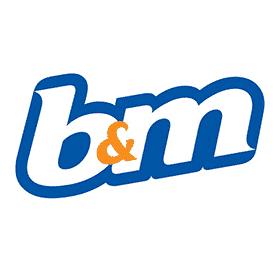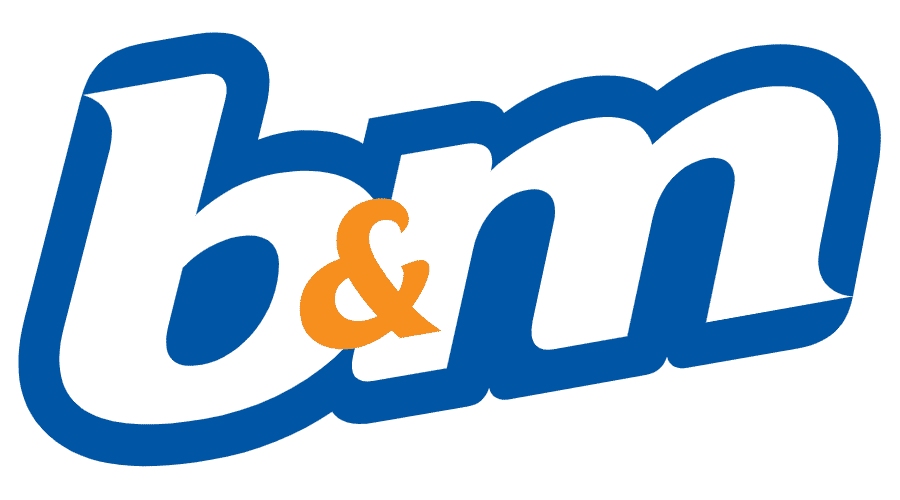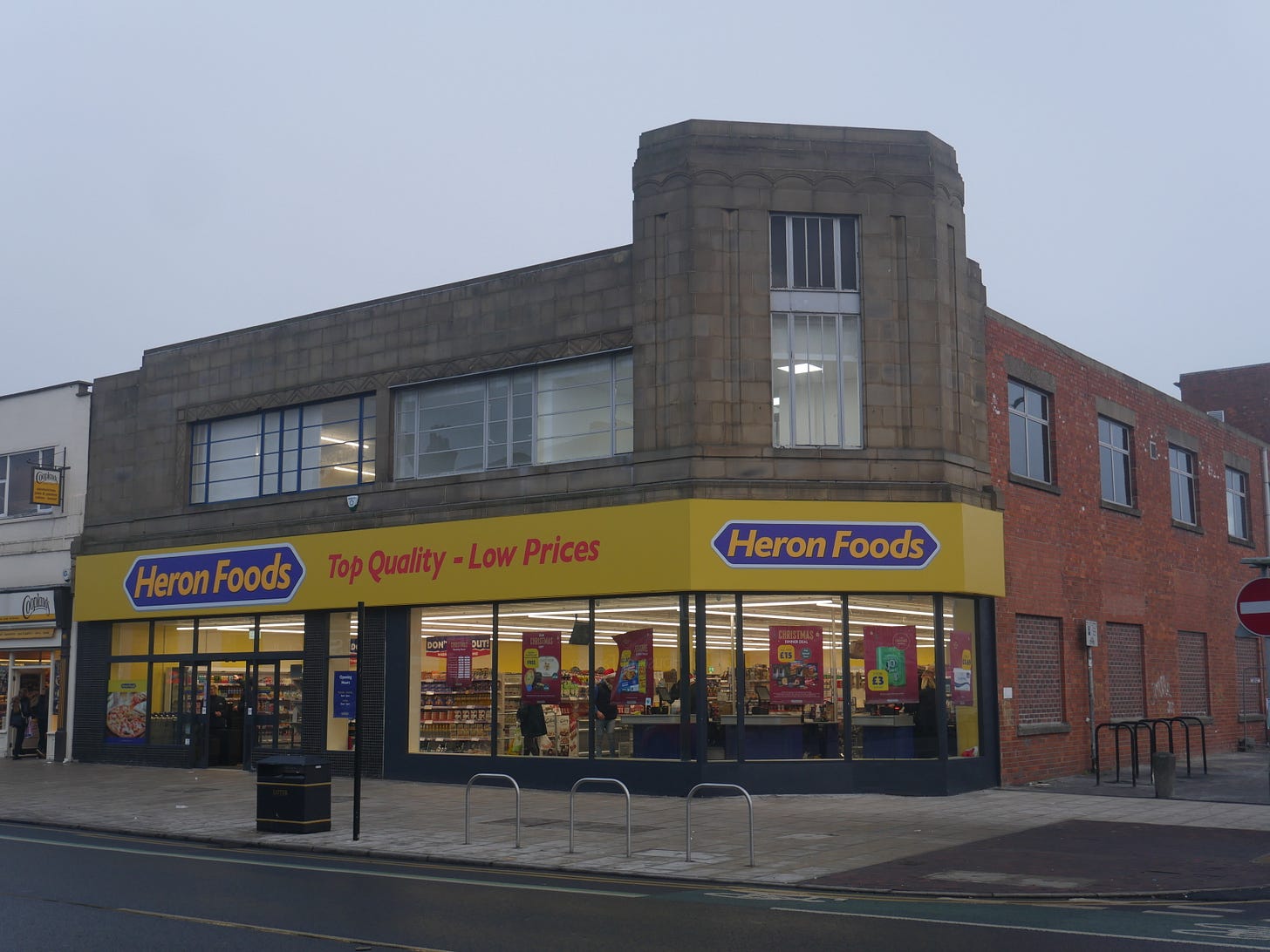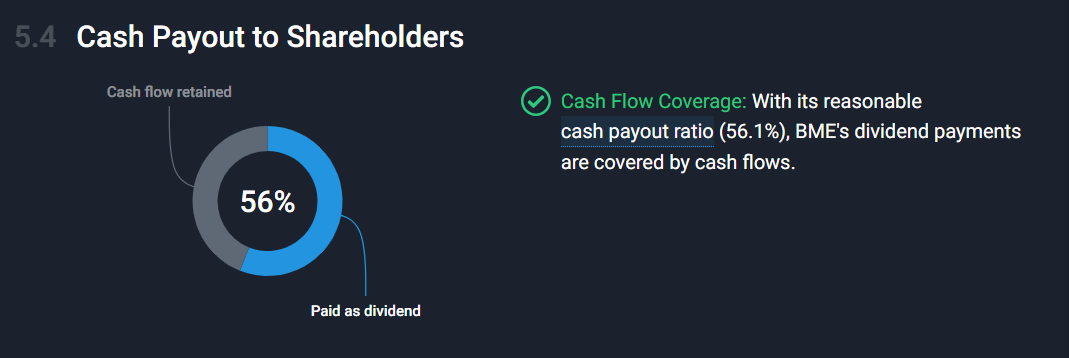Disclaimer: This newsletter is not financial advice. This is for educational purposes only, so please DO NOT take this newsletter as a buy or sell signal.
B&M European Value Retail Fundamentals:
Below is a checklist I usually use when analysing a company's fundamental health. If the company meets my criteria, it will be colour-coded in green, and if it fails to meet my criteria, it will be colour-coded in red, which means I need to investigate further and ask myself why this is the case.
As you can see below, there are two red boxes, and I am going to explain them both:
5-Year Average Profit Margin- When analysing a company, I want to see a 5-year average profit margin above 10%. However, because this company operates in an industry where margins are low, I will not penalise the company for this. On the other hand, 7% is very high for a retailer, and it emphasises the company’s quality.
Current Debt-To-Equity Ratio Below 1.0- B&M has a debt-to-equity ratio of 3.09, which is above my 1.0 threshold. When looking at a company with a debt load like this, it is important to understand what drives it. Currently, B&M has £2.8b in liabilities, where £1.1b is interest-bearing loans and £1.7b is lease liabilities. B&M should not have any issues paying down their debt because most of their debt(£603 million) is due in 2-5 years. B&M has made strides to pay down some of its debt because they have gone from a 2.5x leverage to 2.3x(including lease obligations). The board’s long-term target is below 2.0x leverage.
Business Overview:
Founded in 1978 by Malcolm Billington and Brian Mayman, B&M is a British variety store chain based in Speke. B&M is part of the Luxembourg-based B&M European Value Retail S.A., which owns Heron Foods and operates the B&M (formerly Babou) stores in France. B&M is the leading value retailer, providing customers with a limited assortment of best-selling items across a range of grocery and general merchandise categories, all at value prices. By adopting a simple, low-cost approach to sourcing products directly from manufacturers and leading brand household names, they can offer customers the products they want at compelling prices, helping their shopping budgets go a bit further. As of 2024, the company currently has 741 UK stores and 335 Heron Foods stores. Over the period 2016 to 2018, the company opened another 100 stores, reaching 600 stores in November 2018. In September 2020, the company planned to open about 45 stores, offering everything from tinned and frozen meals to wallpaper and bedding plants, which has become a lockdown phenomenon.
B&M has also been involved in controversies over the years, such as:
Fire Safety-In 2012, B&M pleaded guilty at Mansfield Magistrates Court to six fire safety offences under the Regulatory Reform (Fire Safety) Order 2005 following a visit from Fire Protection officers of the Nottinghamshire Fire and Rescue Service to their Mansfield store in October 2011. Officers had previously visited in June 2011 and found numerous breaches of the order, including blocked fire exits. However, the failings were found to have been repeated in the revisit, and the firm was fined £32,984.17.
Underage Sale OF Knives- In 2018, B&M was fined a record £480,000 by Barkingside Magistrates’ Court for selling knives to three children under the age of 18 in test purchases at stores in Redbridge and Barking. The fine was reduced from £720,000 as the business pleaded guilty.
Pandemic Controversy- In March 2020, due to the pandemic in the United Kingdom, Rishi Sunak(then Chancellor of the Exchequer) gave business rates relief and furlough payments to businesses in the hospitality and retail sectors. B&M was among several companies classified as 'essential retailers' and, as a result, was allowed to remain open when other 'non-essential companies had to close. In November 2020, B&M and other retailers were subject to a public outcry for having not handed back payments totalling £1.8 billion intended for propping up retailers prevented from trading due to restrictions, despite making record profits. The retailer declared £296 million in profit and, as a result, issued a £250 million special dividend despite having received £38 million in business rates relief and £3.7 million in furlough payments. Brothers Simon and Bobby Arora, the CEO and trading director, respectively, received a combined total of £37 million of the special dividend due to their 15% shareholding, which is said to be worth at least £750 million. The firm agreed to pay £80 million in business rate relief it had saved, a move mirrored by major supermarkets including Tesco, Sainsbury's and Morrisons.
Business Segments:
Heron Foods- Formerly Heron Frozen Foods, Heron Foods is an English supermarket chain founded in 1979 and based in Melton with over 335 stores. Heron Foods primarily sells frozen food but has a wide range of ambient and chilled stock with named brands, including Muller, Birds Eye, McCain Foods, and several lines using the Heron Foods brand. Heron Foods sells well-known branded groceries at a competitive price point to suit the bargain-loving shopper. Heron Foods was first registered in October 1978 as Grindells Butchers. The Grindell family opened the first store in 1979. In 1981, shortly after Anthony Grindell sold the business to his sister and her family, the company changed its name to Heron Frozen Foods. In 1999, Heron Foods bought 17 Dawn Til Dusk convenience stores, and after that, the chain went into receivership, bringing its total number of stores to over 100. Malcolm and Sheila Heuck had a joint controlling interest in the company from the beginning, but in 2003, having reached retirement age, they sold their stake to management. From then on, the company was run by their sons Andrew, David, and Michael. In 2012, Heron Foods agreed to buy the Cooltrader frozen foods business from Iceland. The deal included 54 of the 58 shops, as well as the depot and head office of Cooltrader. The acquired Cooltrader outlets were converted to the Heron Foods brand. In August 2017, it was announced that Heron Foods had been sold to B&M for £152 million.
Management:
When evaluating management, I judge the CEO based on several factors, such as experience, capital allocation skills, and Incentives. In this section, I will discuss whether management incentives are aligned with shareholders.
Experience- Alejandro Russo has been B&M’s Chief Executive Officer and Executive Director of B&M since 2022 and served as Group Chief Financial Officer from 2020 until 2022. He has relevant experience across the UK's grocery, general merchandise, and discount retail sectors and internationally. This has included senior leadership positions at retailers such as Asda, Tesco PLC and Kingfisher PLC. Since joining B&M in October 2020, he has demonstrated impressive commercial acumen, operational management skills, and being a highly capable CFO. Alejandro Russo also has an MBA postgraduate degree with a distinction from the London Business School in 1999, followed by an engineering and finance BSc degree with a first.
Below is an image illustrating the current experience of B&M board members:
Capital Allocation- When judging management, capital allocation skills are critical because I want management to create shareholder value, not destroy it. So far, B&M's capital allocation has been spot on because they are giving value back to shareholders via reinvestment into the business to expand their product offering, pay a dividend, pay down their debt, and make strategic acquisitions if the opportunity arises.
B&M is currently paying a dividend with a yield of 3.29%. This dividend is sustainable because it only covers 56% of the company's free cash flow.
Incentive- This is important because if the current board is actively purchasing stock of their own business, this is a positive indicator that shows that management believes the stock is undervalued and believes in the company's long-term prospects.
As you can see below, we have one buy order and zero sell order. Oliver Tant(Non-Executive Director) is the only insider buying B&M shares.
Bull And Bear Case:
Bull Case
Bull Case- The first Bull case is a long runway for growth. B&M expect to reach at least 1,200 B&M stores in the UK, representing at least a 60% increase in store numbers compared to the year-end. With new stores tending to be bigger than the existing average and a higher proportion expected to have garden centres, the underlying growth in sales is expected to be greater than the 60% increase in store numbers. New stores bring increases in volume, and their plans to open 45 stores per annum over three years will add 20% more volume to the company. This brings benefits to buying, productivity gains and cash generation. Payback on new stores tends to be less than a year, so the more stores they open, the better the cash generation.
Bull Case- The second bull case is a strong brand reputation. The B&M and Heron Foods names are established brands in the UK with a strong reputation for consistently delivering great value on the products people regularly buy for their homes and families. In a recent external customer survey, B&M was rated as the 11th most-loved retail brand in the UK. There is growing awareness of the B&M brand in France, and the customer response to recent product changes has been very positive. With discount shopping continuing to become more socially accepted, there are opportunities to attract new customers whilst retaining the loyalty of existing customers in the years ahead. Evidence of reputation building is that B&M was ranked among the top 15 companies with the best reputation with customers online in France.
Bull Case- The third bull case is B&M’s expansion into France. In terms of size and wealth, France has a population similar to the UK, where they aim to have over 1,200 stores. The UK estate sets a relevant benchmark for the potential scale of the French estate over the long term. As the company gently increases its store opening programme, France will experience many years of profitable growth. Since the acquisition of Babou, B&M has transformed their stores to operate under the B&M fascia. B&M will continue to grow its FMCG(Fast Moving Consumer Goods) ranges in France, which will help drive sales densities and provide a “halo effect” for their general merchandise offer. Pricing is highly competitive, and profitability is good, with a strong underlying profit margin that will continue to improve.
Bear Case
Bear Case- The first bear case is competition. B&M operates in a highly competitive retail market in the UK and France, which could materially impact the company’s profitability and share price and limit growth opportunities. B&M has maintained its stock discipline, ensuring that seasonal ranges are sold in total. This allows the company to maximise “newness” for customers each year and avoids the risk of mispriced stock in a period of deflating freight costs. B&M has also maintained its strict SKU count discipline within product ranges, enabling it to react quickly to ever-changing consumer tastes, trends and buying habits. Around half of the company’s revenues in the period continue to come from essential food and FMCG goods. This has allowed B&M to remain insulated from any downturn in consumer spending and resilient against its competitors while continuing to meet its customers’ needs.
Bear Case- The second bear case is store expansion. The ability to identify suitably profitable new store locations is the key to delivering on their growth plans. Failure to identify suitable locations in areas targeted for new stores could impact expansion plans and reduce the growth rate of the business. B&M has continued to screen the market for new location opportunities and respond swiftly to enquiries. The market is also monitored for opportunities arising from retailer corporate actions (e.g. insolvencies such as that of Wilko). Sales densities are routinely measured across all three businesses to ensure that new store space sales densities are accretive to the company. B&M continues to review new store opening opportunities in current store locations, replacing older generation stores with better quality sites and premises and acquiring adjacent space to expand stores and optimise performance.
Valuation:
In this section, I am going to talk about valuation. Using some basic metrics, I am going to compare B&M against its industry rivals and see if the company is cheap relative to its peers; then, I will value B&M using a discounted cash flow model to come up with a price I am willing to pay based on expected growth rate and my desired return of 15%.
As shown below, when compared to its peers, B&M scores 3/6, whilst Ollie Bargains Outlet scores 2/6.
As you can see, based on my conservative assumption, B&M is looking to grow 6%, so I went conservative and assumed a 4% growth in the first 1-3 years, then the growth will slow down to 1% 4-6 years out. In my assumption, I also went with an exit multiple of 10x earnings, which is below the historical average at which B&M has traded. Based on my assumption, I have come to a buy price of £5.74p compared to the current stock price of £4.66p, which means right now, B&M is trading below its intrinsic value.
Thanks for reading my newsletter on B&M. Disclaimer: This newsletter is not financial advice. This is for educational purposes only, so please DO NOT take this as a buy or sell signal.
Follow for more:
Don’t forget to subscribe, share, and comment below if you find this newsletter insightful, as it helps support my work.











👏👏
Great article. I feel the investment is very compelling at current valuation of 258GBX. Has anything changed in your orignal investment thesis over the last 12 months?